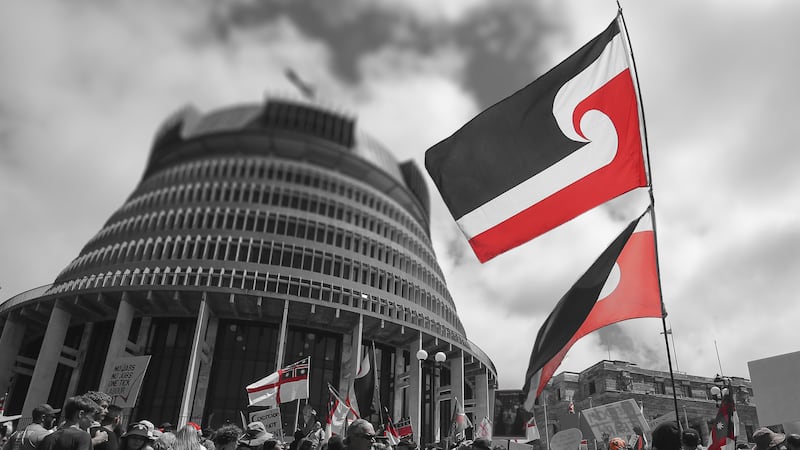Last week, the International Court of Justice issued a landmark ruling that government actions driving climate change are illegal and states should be held legally responsible for their emissions.
The ICJ ruling stated that legal duties regarding climate change apply to fossil fuel consumption, extraction, expansion, and regulation - duties that New Zealand is already breaching through coal mining expansion and offshore oil and gas exploration.
This campaign was started six years ago by 27 Pacific Island law students in Vanuatu. Following the victory, Te Ao Māori News spoke to Belyndar Rikimani, who was overwhelmed with emotions and positivity.
“This advisory opinion is really a big breakthrough for our identity, our people, and our vulnerable communities that have been faced with the adverse impacts of climate change,” Rikimani enthused.

Anahera Nin (Ngāti Toa Rangatira, Ngāti Huia), former Principal Policy Analyst of the Ministry for the Environment, said NZ’s current climate polices are not aligned with this ICJAO or the Paris Agreement.
Nin said ICJ’s ruling is a significant moment for Māori, indigenous peoples, and frontline communities, and validates the calls for stronger action, not only to reduce emissions, but to hold big polluters accountable.
“The Climate Change Commission has been clear in its advice: Aotearoa won’t meet its targets without stronger action to reduce gross domestic emissions,” she stressed.
“We cannot rely on offshore mitigation to meet targets, and the Government’s continued oil and gas exploration efforts directly contradicts the ICJ’s opinion and intent of the Paris Agreement.”

Institutional barriers to ambitious climate policy
The two key institutional barriers Nin identifies are short-term policy design, where decision-makers focus on what is politically beneficial or fiscally cheap in the short term, and structural silos within government.
She said this short-term focus clashes with the intergenerational, mokopuna-focused approach held by many Māori.
Similarly, Rikimani says the success of the ICJ climate ruling is grounded in Pacific values of collective action, shared vision, and community.
The second barrier, structural silos, is where government departments aren’t coordinating, which is necessary as climate change intersects most, if not all, areas of policy, including land use, housing, health, and infrastructure.
“There’s expert consensus on what needs to happen: transition out of fossil fuels, invest in innovative and cleaner infrastructure, and enable community-led adaptation,” she stated.
Solutions are here, but need Government support
The shifts Nin would like to see in Aotearoa’s climate policy include approaches that enable hapori, marae, hapū, and iwi to self-determine their own climate planning and action.
“When Māori are resourced to come to the table and lead — like marae becoming emergency centres, and iwi, hapū developing their own climate strategies — we get enduring, place-based solutions and action.”
The solutions, she said, are already being developed and implemented within our hapori. The real barrier is whether the government is ready to follow Māori leadership.
In her work with Pou Take Āhuarangi of the National Iwi Chairs Forum, Nin and her colleagues connect with hapori, run wānanga, and support their climate assessments, planning, and action.
Opportunity to stand together as Tangata o te Moana-nui-a-Kiwa
“Māori and Pacific peoples share whakapapa; we are united through Te Moananui a Kiwa,” said Nin. “We also share the reality of being on the frontlines of climate change.”
“There’s also an opportunity to see Māori and Pacific peoples stand together and amplify our collective voice in global climate spaces where we’re often underrepresented and/or sidelined.”
This year, Pou Take Āhuarangi of the National Iwi Chairs forum is taking the first-ever Rangatahi Māori Delegation to UNFCC, and Nin said they hope to utilise the opportunity to stand with Pacific whanaunga, as well as First Nations tuakana from Te Whenua Moemoeā in solidarity and as Tāngata o te Moana-nui-a-Kiwa.



